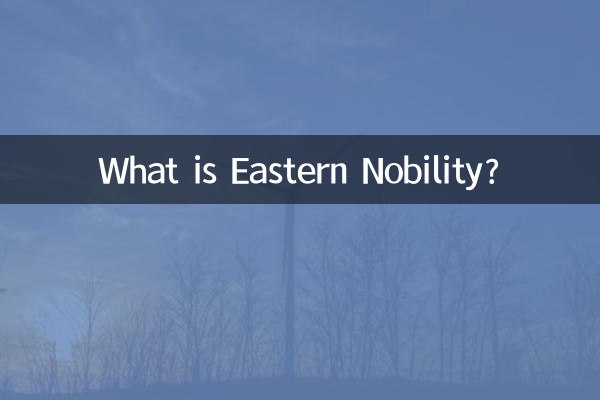What is Eastern Nobility?
In today's society, the word "aristocratic" is often used to describe those who possess wealth, status or elegant taste. However, the connotation of Eastern nobility goes far beyond that. It integrates multiple dimensions such as traditional culture, spiritual cultivation and social responsibility. This article will explore the true meaning of Eastern aristocracy based on the hot topics and hot content on the Internet in the past 10 days.
1. The cultural connotation of oriental aristocracy

Eastern nobility does not only refer to the accumulation of wealth, but also emphasizes cultural inheritance and spiritual realm. The following are discussions related to Eastern aristocratic culture in recent hot topics:
| topic | heat index | core ideas |
|---|---|---|
| renaissance of traditional culture | 9.2 | Eastern aristocrats pay attention to the cultivation of traditional skills such as piano, chess, calligraphy and painting |
| Family tradition inheritance | 8.7 | The aristocratic spirit is reflected in the intergenerational transmission of family values |
| Tea ceremony aesthetics | 7.9 | Etiquette and self-cultivation embodied through the tea ceremony are aristocratic traits |
2. Characteristics of contemporary Eastern aristocrats
Combining recent hot topics, we can summarize several salient characteristics of contemporary Eastern aristocrats:
1.cultural confidence: Maintaining the identity and inheritance of the national culture in the wave of globalization. The recently hotly discussed "Hanfu Movement" is a typical example.
2.social responsibility: A true aristocrat not only pays attention to personal achievements, but also pays attention to giving back to society. The recent news that an entrepreneur made a huge donation to education has sparked widespread discussion.
3.Life aesthetics: The pursuit of quality of life is not only reflected on the material level, but also on the spiritual level. The popularity of new Chinese home design reflects this trend.
| Features | Typical cases | social response |
|---|---|---|
| cultural confidence | A university offers traditional etiquette courses | 120 million reads across the entire network |
| social responsibility | Entrepreneur donates to rural school | No. 3 on Weibo’s hot search list |
| Life aesthetics | New Chinese Tea Room Design Competition | Douyin-related videos have been played more than 50 million times |
3. Comparison of Eastern and Western Noble Concepts
In recent cultural topics, there has been a lot of discussion about the differences between Eastern and Western aristocrats:
Eastern aristocrats emphasized morerestrainedwithharmony, while the Western aristocratic tradition pays more attention toPublicitywithPersonality. For example, when it comes to their attitude towards wealth, Eastern aristocrats pay attention to "hiding their wealth but not showing it", while Western aristocrats tend to display their status through luxurious living.
4. How to cultivate oriental aristocratic temperament
According to the analysis of recent popular lifestyle content, cultivating oriental aristocratic temperament can start from the following aspects:
| aspects | Specific methods | Recent hot topics |
|---|---|---|
| cultural accomplishment | Study classics and learn traditional skills | Popular Chinese Studies Master Lecture Videos |
| etiquette training | Master traditional social etiquette | Revival of traditional wedding etiquette |
| spiritual growth | Meditation, calligraphy and other self-cultivation | Zen meditation experience camp reservations are in hot demand |
5. The modern significance of oriental aristocracy
In today's materially rich world, the spirit of Eastern aristocracy provides us with valuable spiritual guidance:
1.Balance matter and spirit: Don’t be enslaved by material desires and pursue a higher level of spiritual satisfaction.
2.Inheritance and innovation: While cherishing tradition, give it new connotations of the times.
3.Harmony between individuals and society: Organically combine personal achievements with social responsibility to achieve greater life value.
Through the analysis of recent hot topics, it can be seen that the revival of the concept of Eastern aristocracy reflects modern society's pursuit of spiritual homeland. In the fast-paced urban life, more and more people are beginning to re-examine the value of traditional culture and explore a more in-depth way of life. This may be the most practical manifestation of the Eastern aristocratic spirit in contemporary times.

check the details

check the details